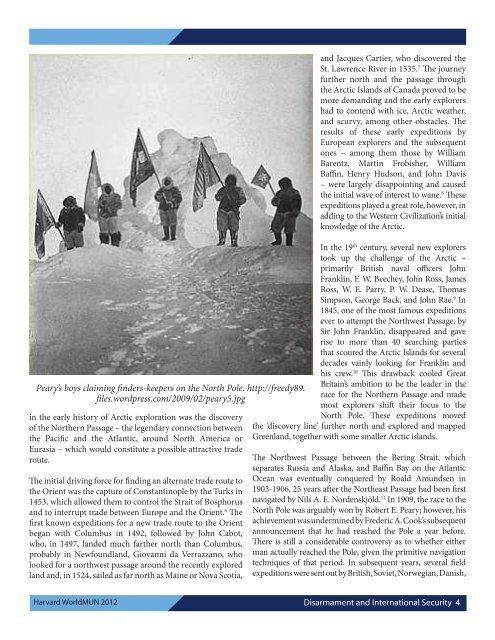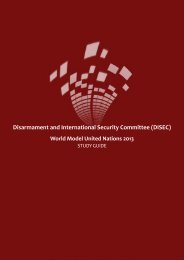Disarmament and International Security - World Model United Nations
Disarmament and International Security - World Model United Nations
Disarmament and International Security - World Model United Nations
Create successful ePaper yourself
Turn your PDF publications into a flip-book with our unique Google optimized e-Paper software.
Peary’s boys claiming finders-keepers on the North Pole. http://freedy89.<br />
files.wordpress.com/2009/02/peary5.jpg<br />
in the early history of Arctic exploration was the discovery<br />
of the Northern Passage – the legendary connection between<br />
the Pacific <strong>and</strong> the Atlantic, around North America or<br />
Eurasia – which would constitute a possible attractive trade<br />
route.<br />
The initial driving force for finding an alternate trade route to<br />
the Orient was the capture of Constantinople by the Turks in<br />
1453, which allowed them to control the Strait of Bosphorus<br />
<strong>and</strong> to interrupt trade between Europe <strong>and</strong> the Orient. 6 The<br />
first known expeditions for a new trade route to the Orient<br />
began with Columbus in 1492, followed by John Cabot,<br />
who, in 1497, l<strong>and</strong>ed much farther north than Columbus,<br />
probably in Newfoundl<strong>and</strong>, Giovanni da Verrazzano, who<br />
looked for a northwest passage around the recently explored<br />
l<strong>and</strong> <strong>and</strong>, in 1524, sailed as far north as Maine or Nova Scotia,<br />
<strong>and</strong> Jacques Cartier, who discovered the<br />
St. Lawrence River in 1535. 7 The journey<br />
further north <strong>and</strong> the passage through<br />
the Arctic Isl<strong>and</strong>s of Canada proved to be<br />
more dem<strong>and</strong>ing <strong>and</strong> the early explorers<br />
had to contend with ice, Arctic weather,<br />
<strong>and</strong> scurvy, among other obstacles. The<br />
results of these early expeditions by<br />
European explorers <strong>and</strong> the subsequent<br />
ones – among them those by William<br />
Barentz, Martin Frobisher, William<br />
Baffin, Henry Hudson, <strong>and</strong> John Davis<br />
– were largely disappointing <strong>and</strong> caused<br />
the initial wave of interest to wane. 8 These<br />
expeditions played a great role, however, in<br />
adding to the Western Civilization’s initial<br />
knowledge of the Arctic.<br />
In the 19 th century, several new explorers<br />
took up the challenge of the Arctic –<br />
primarily British naval officers John<br />
Franklin, F. W. Beechey, John Ross, James<br />
Ross, W. E. Parry, P. W. Dease, Thomas<br />
Simpson, George Back, <strong>and</strong> John Rae. 9 In<br />
1845, one of the most famous expeditions<br />
ever to attempt the Northwest Passage, by<br />
Sir John Franklin, disappeared <strong>and</strong> gave<br />
rise to more than 40 searching parties<br />
that scoured the Arctic Isl<strong>and</strong>s for several<br />
decades vainly looking for Franklin <strong>and</strong><br />
his crew. 10 This drawback cooled Great<br />
Britain’s ambition to be the leader in the<br />
race for the Northern Passage <strong>and</strong> made<br />
most explorers shift their focus to the<br />
North Pole. These expeditions moved<br />
the ‘discovery line’ further north <strong>and</strong> explored <strong>and</strong> mapped<br />
Greenl<strong>and</strong>, together with some smaller Arctic isl<strong>and</strong>s.<br />
The Northwest Passage between the Bering Strait, which<br />
separates Russia <strong>and</strong> Alaska, <strong>and</strong> Baffin Bay on the Atlantic<br />
Ocean was eventually conquered by Roald Amundsen in<br />
1903-1906, 25 years after the Northeast Passage had been first<br />
navigated by Nils A. E. Nordenskjöld. 11 In 1909, the race to the<br />
North Pole was arguably won by Robert E. Peary; however, his<br />
achievement was undermined by Frederic A. Cook’s subsequent<br />
announcement that he had reached the Pole a year before.<br />
There is still a considerable controversy as to whether either<br />
man actually reached the Pole, given the primitive navigation<br />
techniques of that period. In subsequent years, several field<br />
expeditions were sent out by British, Soviet, Norwegian, Danish,<br />
Harvard <strong>World</strong>MUN 2012<br />
<strong>Disarmament</strong> <strong>and</strong> <strong>International</strong> <strong>Security</strong> 4

















